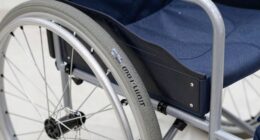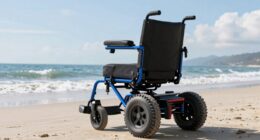Ellen Burstyn, at 90, continues to inspire by openly discussing aging and wisdom. She's dedicated to challenging ageism in Hollywood, refusing to let stereotypes dim her star power. With over seven decades in the industry, Burstyn knows the importance of authenticity in acting. She leads a vibrant life, embracing healthy habits, gratitude, and meaningful connections, including her love for animals. Her insights reflect her commitment to personal growth and resilience. If you're curious about the lessons she's learned over the years and how they shape her views today, you'll find much more to explore.
Key Takeaways
- Ellen Burstyn advocates against ageism in Hollywood, emphasizing the importance of older women's roles in film and media.
- She maintains a healthy lifestyle, focusing on nutrition, exercise, and mindfulness to enhance vitality and well-being.
- Burstyn's acting philosophy revolves around "truth in acting," prioritizing emotional authenticity and collaboration with like-minded directors.
- Life lessons from her childhood highlight resilience, empathy, and the significance of social connections in personal growth.
- Deep bonds with animals, especially dogs, offer her companionship, emotional support, and a sense of gratitude in daily life.
Career Longevity Insights

Ellen Burstyn's career longevity offers valuable insights into maintaining energy and relevance in a demanding industry. At 90, she's still actively juggling two film productions, proving that age doesn't have to limit your ambitions. Her commitment to a healthy lifestyle—following a vegetarian diet, exercising regularly, and steering clear of alcohol, smoking, and drugs—fuels her liveliness. You might find inspiration in her daily practice of expressing gratitude, which sets a positive tone for her day. Additionally, her continued work in film showcases her belief that ageism in Hollywood is often overstated. Maintaining emotional alignment can further enhance one's ability to navigate the challenges of aging gracefully.
An active social life also plays an essential role. Burstyn enjoys walking dogs, reading, attending concerts, and spending time with friends, keeping her engaged and connected. She believes in continuous learning, finding joy in various interests that keep her both mentally and physically active.
Her ability to adapt and embrace change is another key factor. Moving to New York City at 80 for a more vibrant environment shows her willingness to seek out new experiences. Ellen's resilience during challenging times, like the pandemic, demonstrates that maintaining relationships and finding joy in simple activities can sustain your passion and purpose, regardless of age. Embracing life with enthusiasm can keep your career flourishing, just as it has for her.
Awards and Accolades Overview

Burstyn's remarkable achievements in film and television reflect her talent and dedication to her craft. She won an Academy Award for Best Actress for her unforgettable performance in *Alice Doesn't Live Here Anymore* (1975). Additionally, she boasts multiple Oscar nominations, including for *The Exorcist* (1974) and *Requiem for a Dream* (2000), showcasing her versatility across genres. Her success is reminiscent of other industry icons who have leveraged their talents in both acting and real estate investments.
Her Emmy accolades further highlight her impact on television. Burstyn won two Primetime Emmy Awards for her roles in *Law & Order: Special Victims Unit* (2009) and *Political Animals* (2013), along with several nominations for other standout performances. Her Emmy win in 2009 marked her achievement of **triple crown status, solidifying her legacy in the industry.
Beyond these, Burstyn's other notable awards include a BAFTA Film Award for *Alice Doesn't Live Here Anymore* (1976), a Golden Globe for *Same Time, Next Year* (1979), and a Tony Award for Best Actress in the same play. She's also earned recognition from the Boston Society of Film Critics and the Chicago Film Critics Association for her role in *Requiem for a Dream* (2000).
Inducted into the American Theatre Hall of Fame in 2013, Burstyn's contributions extend well beyond the screen, marking her as a true icon in the industry.
Iconic Film Roles

Iconic Film Roles
Throughout her illustrious career, Ellen Burstyn has captivated audiences with a range of iconic film roles that showcase her extraordinary talent and depth as an actress. You can't help but be drawn to her powerful performances, whether she's playing a tormented mother or a resilient survivor. Burstyn is particularly known for her ability to elevate roles in horror and drama, making her performances resonate deeply with viewers. Her work reflects the transformative power of art in society, illustrating how storytelling can influence diverse cultural perspectives.
Here's a glimpse of some of her most memorable roles:
| Film | Role |
|---|---|
| The Exorcist (1973) | Chris MacNeil |
| Alice Doesn't Live Here Anymore (1974) | Alice Hyatt |
| Resurrection (1980) | A woman with healing powers |
| Requiem for a Dream (2000) | Sara Goldfarb |
| Pieces of a Woman (2020) | Elizabeth Weiss |
Burstyn's portrayal of Chris MacNeil in *The Exorcist* redefined horror, while her role in *Alice Doesn't Live Here Anymore* earned her an Academy Award. Whether in supporting parts or leading roles, she consistently brings depth to her characters. Even in her recent work, like *The Exorcist: Believer* (2023), she continues to leave an indelible mark on the film industry. You can't help but admire her versatility and commitment to storytelling.
Unique Acting Philosophy

Many actors find their unique approach to performance shapes how they connect with their characters and audiences. Ellen Burstyn's acting philosophy revolves around "truth in acting," a principle she honed during her training at the Actors Studio. Embracing the Method acting technique, she draws from her lived experiences to create emotionally authentic performances. Whether she's researching troubled women in Brooklyn for *Requiem for a Dream* or reflecting on personal relationships in her memoir, Burstyn believes that understanding a character's background and motivations is essential. Additionally, her focus on data privacy reflects the importance of maintaining a secure environment, similar to how actors protect their emotional truths.
Physical transformations also play a significant role in her craft. She's known for making bold choices, like wearing fat suits or altering her weight to more accurately portray characters. Burstyn actively avoids feelings of fakeness in her performances, likening it to consuming rotten food. Her commitment to her roles is evident in her portrayal of complex characters, such as Sara Goldfarb in *Requiem for a Dream, which showcases her dedication to authenticity.
Collaboration is vital for her, too; she seeks directors who share her artistic vision, such as Martin Scorsese. Her dedication to being open and real on screen fosters deep emotional connections, both with her fellow actors and the audience. This unique philosophy not only enriches her performances but also resonates with viewers, making her an enduring presence in film.
Ageism in Hollywood

As Burstyn exemplifies a commitment to authenticity and emotional depth in her performances, the harsh reality of ageism in Hollywood starkly contrasts her artistic vision. In an industry where the average age of female lead actors has plummeted, women over 30 contend to find significant roles. You'll notice that while men age gracefully into leading roles, women often see their opportunities dwindle drastically after 30, facing a mere 20% of leading roles past that age.
Moreover, in 2019, no women over 50 were cast in leading roles in top films. Older female characters are frequently portrayed through negative stereotypes: stubborn, unattractive, or physically inactive. You hardly see romantic relationships featuring older women, and the representation of diverse older bodies remains scarce. Additionally, this trend is further highlighted by the fact that past age 30 women hold only 20% of leading roles, while men retain 80%. The lack of meaningful representation not only affects actors but also impacts the narratives told in films, often sidelining stories of older women. This marginalization extends beyond film to broader cultural narratives, where older women are often rendered invisible or relegated to the sidelines of storytelling. Consequently, the genre of erotic fiction rarely includes older women and erotic fiction, missing an opportunity to explore the complexities of desire and intimacy in later life. By neglecting these stories, the entertainment industry not only perpetuates harmful stereotypes but also denies a significant demographic the chance to see themselves represented in ways that reflect their realities and experiences.
This systemic ageism extends beyond acting, affecting directors and writers as well. As directors grow older, their hiring prospects diminish. Advocacy groups like Age Inclusion in Media (AIM) endeavor to combat these biases, but the industry's pervasive attitudes continue to stifle meaningful representation. It's time for Hollywood to rethink its approach and embrace the richness that older women bring to the screen.
Personal Reflections on Aging

In her 90 years, Ellen Burstyn has embraced aging as a journey filled with growth and insight. You can see her energy in the way she continues to take on challenging roles, proving that age doesn't limit your potential. With over seven decades in the industry and more than 160 projects under her belt, she shows that adaptability is key. By refusing to retire, she inspires you to keep pursuing your passions, no matter the age. In fact, Burstyn's career spans over seven decades, showcasing her remarkable longevity in the industry.
Burstyn reflects on how her life experiences have shaped her compassion and understanding of others. Her painful past has deepened her empathy, allowing her to portray characters with authenticity and depth. You might find it fascinating that she approaches acting with a series of probing questions, seeking to connect with the human experience in a genuine way. Engaging in the Vortex energy can further enhance her ability to connect with her characters on a deeper level.
Her decision to move to the city at 80 highlights her belief in staying engaged and active. Burstyn's journey teaches you that aging isn't a decline but an opportunity for continued growth, encouraging you to embrace every stage of life with resilience and curiosity.
Gratitude and Daily Practices

Ellen Burstyn's journey through aging is not just about personal growth; it also reflects a deep sense of gratitude that permeates her daily life. At 88, she actively seeks out diverse roles, appreciating every opportunity to collaborate with talented peers in the film industry. This gratitude extends to the recognition and awards she's received, which serve as reminders of the experiences and wisdom gained from her characters. Her commitment to her craft is evident in her remarkable vitality as she continues to challenge herself with new roles, embodying the principles of resilience that allow her to thrive in her pursuits.
To maintain her energy, Ellen embraces daily practices that keep her engaged and fulfilled. Here's a look at her approach:
| Daily Practice | Benefit |
|---|---|
| Physical Activity | Boosts health and energy |
| Continuous Learning | Enhances personal growth |
| Creative Engagement | Fosters social connections |
| Mindfulness and Positivity | Cultivates a sense of purpose
Life Lessons From Childhood

Many people find that the life lessons learned in childhood shape their character and outlook as they grow older. These early experiences lay the groundwork for how you navigate life's challenges. Here are some vital lessons that often stick with you:
- Honesty and Responsibility: You learn that honesty builds trust and strong relationships. Taking responsibility for your actions fosters personal growth, helping you accept mistakes and learn from them.
- Coping with Disappointment and Failure: Life isn't always fair, and learning to accept what you can't control is essential. Dealing with setbacks develops resilience, preparing you for future challenges.
- Value of Hard Work and Perseverance: Hard work brings a sense of accomplishment. You discover that perseverance is key to achieving goals, and giving up isn't an option when mastering new skills.
- Importance of Social Skills and Empathy: Sharing and taking turns teach you kindness and collaboration. Developing empathy allows you to understand and respect others' feelings, creating a sense of belonging.
These childhood lessons guide you, helping you build a life filled with integrity, resilience, and meaningful connections. Additionally, recognizing patterns of behavior from early relationships can provide insights into your current dynamics and foster personal growth.
Connection With Animals

A deep connection with animals can profoundly enrich your life, offering companionship and emotional support that often goes unspoken. For many, including Ellen Burstyn, dogs play a significant role in daily gratitude practices. You might find yourself reflecting on the joy and comfort these furry friends bring, recognizing their presence as a source of emotional value.
Burstyn humorously notes, "My dog knows all my secrets, but she's sworn to secrecy!" This light-hearted remark highlights the trust and confidentiality inherent in the bond you share with your pet. It's a relationship built on understanding and loyalty, where your dog becomes a confidant in your life's journey. The connection you develop with animals can also enhance your ability to understand human complexity, as their genuine companionship fosters emotional depth. Additionally, socializing your dog in diverse environments contributes to healthy development and reduces fearfulness.
While there may not be extensive discussions about animals in interviews, their significance remains clear. You can appreciate how these connections provide a sense of calm and companionship amid life's complexities.
In recognizing the role of animals in your life, you embrace the emotional support they offer, making them an integral part of your daily reflections and gratitude. In this way, the companionship of dogs, as noted by Burstyn, becomes a cherished aspect of your experience, enhancing your overall sense of well-being.
Frequently Asked Questions
What Inspired You to Pursue a Career in Acting?
You're inspired to pursue acting by the power of storytelling and the chance to explore different lives. The thrill of stepping into characters allows you to express emotions and connect with audiences on a deep level. You see acting as a way to share human experiences, revealing struggles and triumphs. Plus, the challenge of embodying unique roles drives your passion, pushing you to grow and evolve as an artist in this dynamic industry.
How Do You Stay Physically Active at 90?
At 90, staying physically active is all about engaging in meaningful work and embracing new challenges. You immerse yourself in diverse film projects, keeping your body and mind sharp. Living in a vibrant city fuels that activity, while your passion for acting drives you to continually learn and grow. You'll find that gratitude and a commitment to health create a dynamic lifestyle, ensuring you remain busy and fulfilled without even considering retirement.
What Hobbies Do You Enjoy Outside of Acting?
You might say your hobbies are like a cozy sweater—comforting and warm. Besides acting, you immerse yourself in reading extensively and appreciate poetry, especially works by Mary Oliver. You also enjoy socializing with friends, often hosting gatherings that spark laughter and creativity. Walking your dogs keeps you active, while memorizing poems adds a layer of joy to your day. Each hobby enriches your life and fuels your passion for creativity and connection.
Who Are Your Biggest Influences in the Industry?
When you think about your biggest influences in the industry, several names likely come to mind. You might admire directors who push boundaries or actors whose performances resonate deeply with you. The greats, like Meryl Streep or Al Pacino, inspire your craft and drive you to refine your skills. Each influence shapes your perspective, reminding you of the art's power and complexity, and you find motivation in their dedication and talent.
What Advice Do You Have for Aspiring Actors?
If you're an aspiring actor, embrace versatility. Explore diverse roles across film, TV, and theater to broaden your skills. Don't shy away from continuous learning; study under experienced mentors and adapt to new styles. Prioritize your health, both physically and mentally, and be ready for challenges. Seek opportunities to contribute to the industry, whether through mentoring or participating in festivals. Remember, resilience is key to a long-lasting career. Keep pushing forward!









